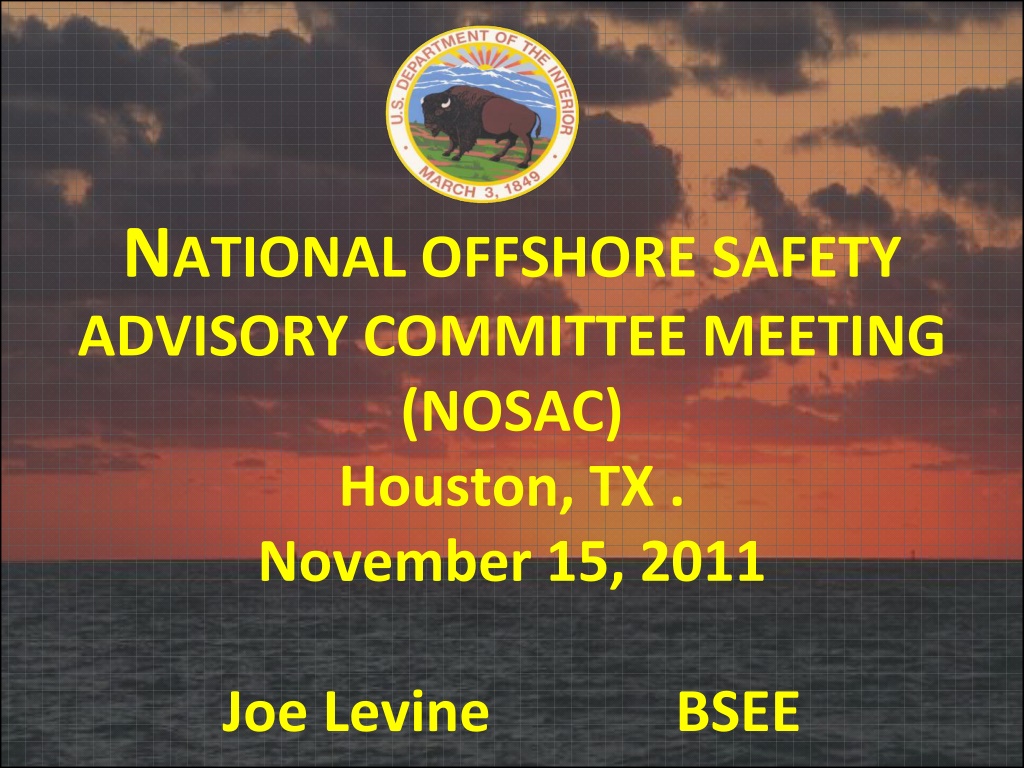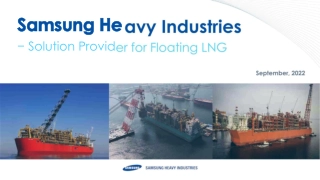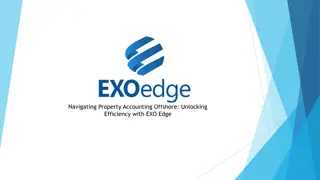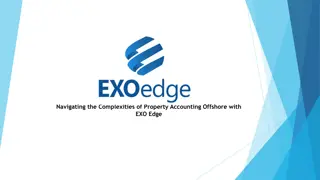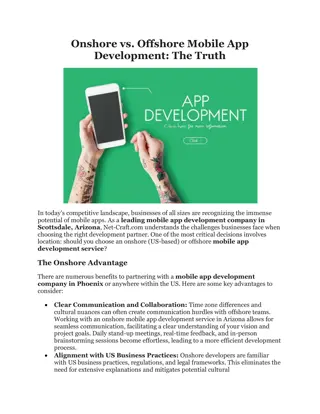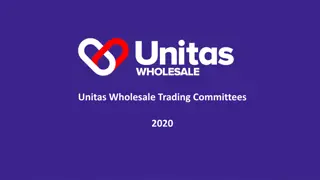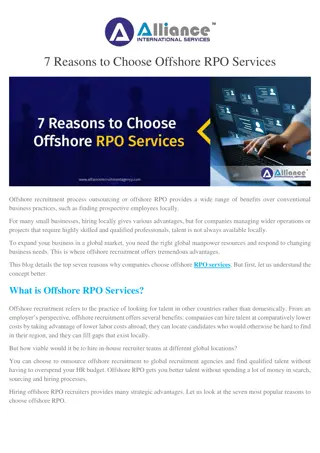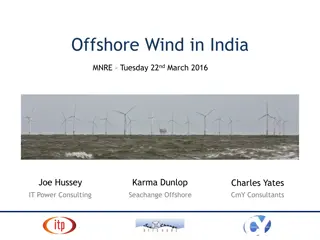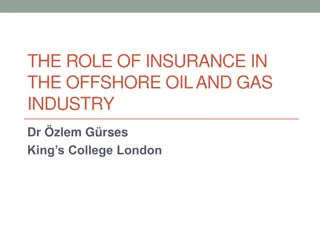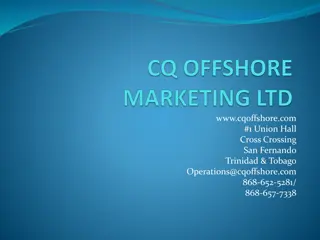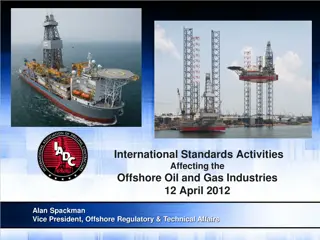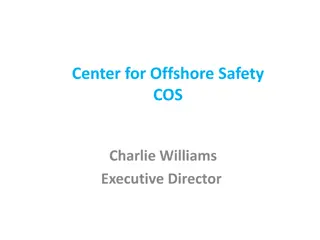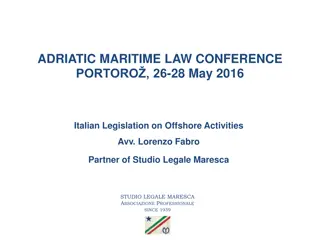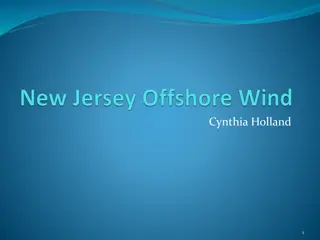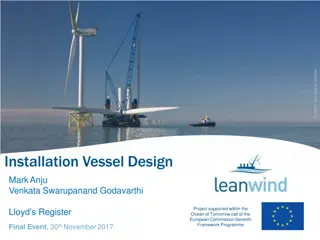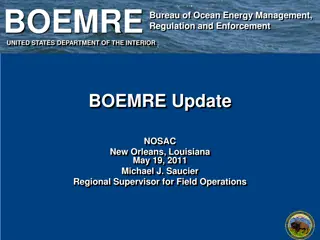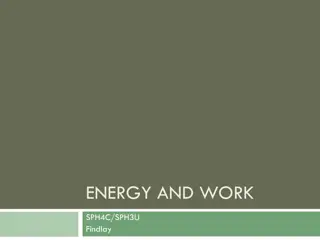Offshore Safety Advisory Committees for Energy Sector
The National Offshore Safety Advisory Committee (NOSAC) and Ocean Energy Safety Advisory Committee (OESC) were established to enhance safety standards, containment capabilities, and regulations in offshore drilling operations. The committees focus on spill prevention, response, containment, and safety management systems to ensure effective oversight. Participants include industry experts, federal agencies, universities, and NGOs, working collaboratively to address critical safety issues in the oil and gas sector.
Uploaded on Sep 10, 2024 | 0 Views
Download Presentation

Please find below an Image/Link to download the presentation.
The content on the website is provided AS IS for your information and personal use only. It may not be sold, licensed, or shared on other websites without obtaining consent from the author. Download presentation by click this link. If you encounter any issues during the download, it is possible that the publisher has removed the file from their server.
E N D
Presentation Transcript
NATIONAL OFFSHORE SAFETY ADVISORY COMMITTEE MEETING (NOSAC) Houston, TX . November 15, 2011 Joe Levine BSEE
OCEAN ENERGY SAFETY ADVISORY COMMITTEE (OESC) Briefing
DEEPWATER HORIZON Incident April 20, 2010 11 Fatalities 4 Million Barrels of Oil Spilled Environmental and Community Impacts Change/Moving Forward How the U.S. Regulates Offshore Oil & Gas Particularly Deepwater Operations How the U.S. Prevents, Contains, and Responds to Spills How the U.S. Manages Offshore Safety Use of a Safety Management System 3
WHAT THE COMMITTEE IS We have brought together some of the most experienced and knowledgeable people in the country to help ensure that safety standards, well containment capabilities, and regulations never again fall behind drilling technology and practices. Secretary Ken Salazar, 3-11-11 OESC Federal Advisory Committee Act (FACA) Chartered on February 8, 2011 2 Year Term Established to Advise the Secretary Through the Director of BSEE on Matters and Actions Related to Offshore Energy Safety 4
OESC COMMITTEE STRUCTURE The Safety Committee will play an important role in bringing to bear the expertise, ideas and experience of some of the most knowledgeable people in industry, academia and elsewhere on offshore drilling and safety issues. - BSEE Director Michael Bromwich, 3-11-11 Committee Membership: Dr. Thomas O. Hunter, OESC Chairman 15 Members from Federal Agencies, Offshore Industry, Academia, and Non-Governmental Organizations Subcommittees/Areas of Focus: Spill Prevention Spill Response Spill Containment Safety Management Systems 5
OESC PARTICIPANTS Public States (invited) Universities (MIT, U of TX) Industry (Shell, Chevron, Noble, Technip) Federal (BOEM, BSEE, DOE, USCG, EPA, NOAA, USGS) NGO (Wilderness Society) 6
SUBCOMMITTEE AREAS OF FOCUS Spill Prevention - How Can Blowouts and Oil Spills be Prevented? Spill Response - How Can Spills Best be Cleaned up Once They Occur? Spill Containment - How Can Spills be Stopped or Contained if a Blowout Occurs? Safety Management Systems - How Can Management Systems be Incorporated to Increase the Safety of OCS Oil and Gas Development? 7
1ST COMMITTEE MEETING Washington, DC: April 18, 2011 Topics Discussed: Findings and Recommendations of the National Commission on the BP Deepwater Horizon Oil Spill and Offshore Drilling Speaker: Cherry A. Murray, Commissioner Investigations into the Causes of the Deepwater Horizon Blowout Speakers: Donald C. Winter, Chair of the National Academy of Engineering Sean C. Grimsley, Deputy Chief Counsel Lessons Learned from the Deepwater Horizon Containment Response Effort Speakers: James H. Dupree, BP Roy A. Nash, U.S. Coast Guard Lars T. Herbst, BSEE 8
2nd COMMITTEE MEETING New Orleans, LA: July 13-14, 2011 Topics Discussed: Industry Initiatives on Offshore Oil & Gas Safety Speakers: Martin W. Massey, Marine Well Containment Co. Hani Sadek, DeepStar BOEMRE Well Containment Screen Tool Speaker: Bryan A. Domangue, BSEE Subcommittee Reports on Progress Government Agency Presentations on Offshore Oil &Gas Speakers:David G. Westerholm, NOAA Christopher A. Smith, DOE Stephen H. Hickman, USGS Patrick E. Little, USCG Walter D. Cruickshank, BOEM 9
3rd COMMITTEE MEETING Washington, DC: November 7-8, 2011 Topics Discussed: Outreach to Academic SC Report & Interim Recommendations BSEE Incident Data Analysis Speaker: David Izon, BSEE SEMS Development & Implementation Speakers: Skip Koshak, Shell Exploration & Production Co. (Major) Gene Cella, Stone Energy (Independent) Summary of Findings of Deepwater Horizon Joint Investigation Team Speakers: Kirk Malstrom, Mike Farber, BSEE Captain David Fish, USCG 10
3rd COMMITTEE MEETING CONTINUED Topics Discussed: American Petroleum Institute (API) Standards: 1. API RP 96 - Deepwater Well Design and Construction 2. API Bulletin 97 - Well Construction Interface Document Guidelines Speaker: Rick Graff, Chevron SEMS II: Proposed Rule-Revisions to SEMS Speaker: David M. Nedorostek, BSEE Comment Period Closed 11/14/2011 BOP Monitoring Speaker: Frank Chapman, Ashford Technical Services Discussion and Vote on Interim Recommendations from SC to the Full Committee 11
3rd COMMITTEE MEETING INTERIM RECOMMENDATIONS Response SC Cascading of Spill Response Equipment Spill Assessment, Preparedness & Response in the Arctic Full-Scale Testing of Response Equipment Interagency Coordination on Spill Response Issues Containment SC Organizational & Systems Readiness for Containment Response Instrumentation & Data to Diagnose Mechanical Condition of Well After LWC Assessing & Mitigating Risks Posed by Underground Blowouts Secondary Capabilities & Systems for Back-Up BOP Operation Containment Scenario Planning 12
3rd COMMITTEE MEETING INTERIM RECOMMENDATIONS Prevention SC How Can Regulatory & Enforcement Systems be Used to Improve BSEE Program in Regards to Spill Prevention Identify Research for Federal Govt., Industry & Academia to Bolster Spill Prevention Development & Implementation of Automated Systems to Improve Capability to Prevent LWC Safety Management SC Safety Culture Development in Industry & Within Regulatory Body Implement an Optimum Safety Management System to Improve Safety System Performance (Safety Case?) Develop a Learning Environment that Fosters Continuous Improvement 13
NEXT STEPS 4th OESC Meeting to be Held Early 2012 (March, April) Possible Houston Location SC will Continue to Meet as Required SC will Continue to Develop and Refine Recommendations to Full OESC for Transmission Through BSEE to Secretary of Interior Final SC Recommendations to be Discussed and Agreed Upon During 4th Meeting 14
PUBLIC INPUT Opportunities for Public Input: Meetings Offer Public an Opportunity to Provide Comment Public Comments in All Forms Welcome Website: http://www.bsee.gov/mmab/EnergySafety.htm Contact Information Please Contact: Joseph Levine, OESC Designated Federal Officer (DFO) (703) 787-1033 Email: OESC@bsee.gov 15
QUESTIONS? COMMENTS? INPUT? 16
